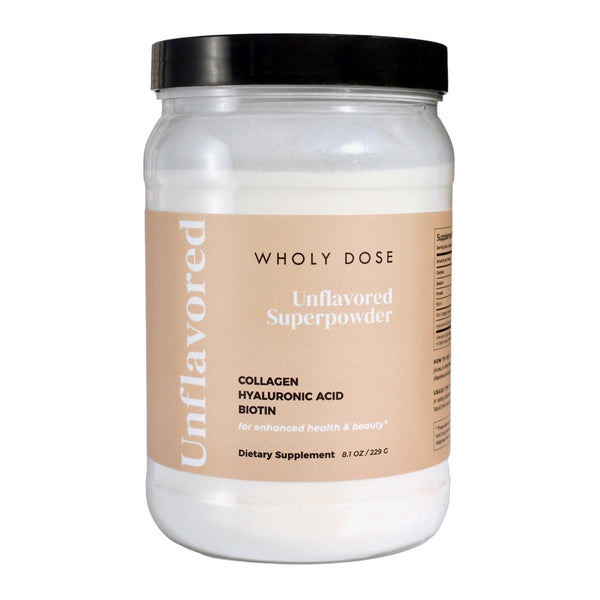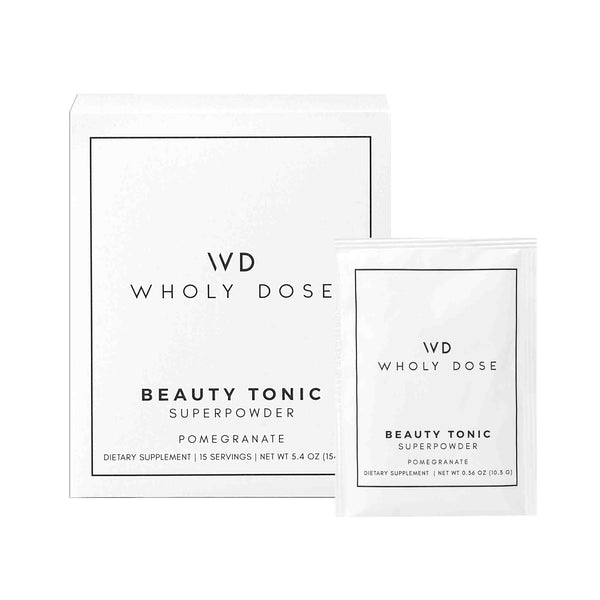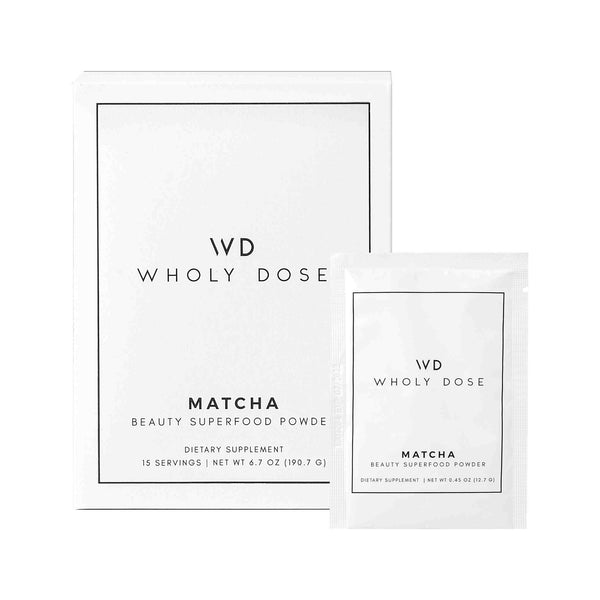
10 Top Benefits of Taking Collagen Supplements, According to Science
Collagen is a major buzzword these days and can be found in countless products. The benefits you may have heard about include hair, skin, and nails, but it goes much deeper than that.
As we get older, starting in our twenties, our body produces less collagen at a declining rate of 1.5% per year. This leads to signs of aging such as wrinkles, dry skin, brittle hair and nails, weaker joints and muscles, and digestive issues.
Think of collagen like glue – it holds our body together by giving structure to our connective cells and tissue.
Collagen is a vital protein that makes up 30% of the total protein in our bodies, 80% of our skin, hair, muscles, joints, and 90% of our bone mass. In other terms, it’s pretty important.
Science shows that by taking collagen supplements, we can replenish collagen levels to combat the aging process and gain health and beauty benefits. Our bodies depend on collagen to do things like keep skin hydrated and plump, hair and nails strong, joints robust, and digestive system working properly, to name a few.
This article reviews the benefits of taking collagen supplements, backed by science and research.
Benefits of Collagen Peptides Supplements
1. Collagen for Your Skin
Science shows that when taken consistently, collagen has positive benefits on the skin.
Collagen helps repair and replace damaged skin tissue by creating new cells and replenishing connective tissue. This restoring of skin cells occurs in the dermis layer of skin and improves skin health, including improving elasticity.
Here are skin benefits from taking collagen supplements.
- Increases skin hydration and plumpness
- Diminishes appearance of wrinkles
- Improves skin texture and tone
- Brightens complexion
- Can diminish look of dark eye circles
- Helps with healing of scars and wounds
- Reduces appearance of cellulite and stretch marks
2. Collagen for Hair & Hair Growth
Much like skin, our hair also undergoes chronological aging. The older we get, the more susceptive we are to hair damage, brittle hair, and hair loss.
Collagen makes up roughly 70% of the dermis layer of our skin – the same layer where the root of each hair follicle is located.
By consuming collagen supplements, we can maintain a healthy dermis and increase hair follicle regeneration through abundant protein intake that is needed to build keratin for healthy hair.
- Strengthens hair follicles
- Combats hair thinning
- May stimulate thicker hair growth
- Helps decrease hair brittleness
3. Collagen for Nails
Our nails undergo changes as we age, including brittleness, discoloration, and weaker, thinner nails.
One of the most vital amino acids for nail growth, arginine, is found in collagen. Studies show that taking collagen helps to increase nail growth, reduce the brittleness of nails, and decrease the frequency of nails breaking.
- Strengthens nails
- Stimulates nail growth
- Reduces brittleness of nails
- Decreases frequency of nails breaking
4. Collagen for Joints & Bones
Have you ever felt stiffness or pain when you move? That’s likely due to the loss of collagen. When it comes to our joints and bones, collagen is crucial in keeping them strong and healthy.
Think of ingesting collagen like lubricating a creaky door hinge. Collagen helps "lubricate" our joints and bones – it helps hold our bones together to make our joints move smoothly.
Studies have found that collagen helps reduce joint pain and the risk of joint deterioration.
- Decreases joint pain
- Reduces risk of joint deterioration
- Strengthens bones
- Regenerates bone tissue
- Improves quality and health of bones
5. Collagen for Your Muscles
Collagen is a major component of your muscle tissue.
Studies show that the body’s process for healing torn or ruptured muscles involves the regeneration of muscle fibers and connective scar tissue. Taking collagen helps with this healing process since collagen helps restore connective tissue throughout the body.
Other studies have found that taking collagen supplements helps increase lean muscle mass and may increase muscle strength, especially when paired with working out.
About one-third of protein found in collagen is glycine. Glycine (an amino acid) helps form another amino acid called creatine, which is known to promote healthy muscles.
- Aids with muscle recovery
- Restores muscle tissue
- Can increase muscle strength
- Increases lean muscle mass
6. Collagen for Digestion & Gut Health
Collagen helps heal the lining of our gastrointestinal tract (GI tract) – otherwise known as our digestive system and gut.
Many diseases and health issues are traced back to poor gut health. Our gut plays a crucial role in a number of gastrointestinal diseases such as inflammatory bowel disease (IBD) and irritable bowel syndrome (IBS). Glutamine, an amino acid found in collagen, is known to restore bowel functioning.
According to Dr. Nicole Avena, collagen is a hydrophilic molecule (has an attraction to water and acidic molecules), and ingesting it improves our digestion and can help food move through the GI tract more smoothly – helping to regulate bowel movements.
Something else that's important to note, is that as we age, we’re more prone to a leaky gut (intestinal permeability), which is a condition where bacteria toxins and acids “leak” through our digestive tract. This may lead to bloating, low energy, brain fog, weight gain, headaches, joint pain, food sensitivities, low metabolism, digestive problems, and skin issues such as acne, eczema, or rosacea, to name a few. Glutamine, an amino acid that's predominantly in collagen, helps prevent inflammation and help heal a leaky gut.
Collagen helps support a healthy digestive system and gut health.
- Improves digestion and digestive issues
- Improves gut health
- Reduces inflammation
- Balances bowel movements
7. Collagen for Your Immune System
Did you that our immune health is linked to our gut health?
Taking collagen supplements help line our gut, keeping it happy and healthy. This, in turn, prevents bacteria and toxins from leaking into our gut that cause sickness and diseases. Thus, supporting our immune system to keep it healthy and strong.
8. Collagen for Metabolism & Energy
Collagen contains glycine, an amino acid that helps form muscle tissue by converting glucose into energy to feed muscle cells. This process helps boost your metabolism and increase energy production.
Moreover, muscles burn more calories than fat – so, taking collagen is shown to increase lean muscle mass by boosting your metabolism.
- Boosts metabolism
- Increases energy production
9. Collagen for Healthy Weight & Appetite
A main reason why we consume protein is to help keep our bodies full and nourished. Collagen is low in fat and high in protein, which helps keep us full and satisfied. This, in turn, may help reduce bad cravings.
Studies have found that taking collagen supplements increases the satiety hormone, which helps control hunger and curb cravings that contain ingredients such as salt, sugar, oil, or fatty foods.
Studies have also found that consuming collagen keeps you more full and satisfied than other protein powders such as whey and soy protein.
- Balances appetite
- Helps curb bad cravings
- Helps maintain a healthy weight
10. Collagen and Sleep
Collagen is known to improve overall sleep quality due to glycine, an abundant amino acid found in collagen that has been linked to affecting neurotransmitters to promote better sleep quality.
Side Effects of Taking Collagen Supplements
According to studies, there are zero to minimal side effects when taking collagen. Studies show that collagen may have the potential to cause digestive discomfort, such as feelings of fullness. This is likely due to the body not being used to the way the amino acids in collagen are broken down in the stomach. When this does occur, the stomach needs to get used to breaking down collagen – just as with other types of food that your body is not used to breaking down.
Things To Know Before Taking Collagen Supplements
Now that you know the benefits of taking collagen, it’s crucial to recognize that collagen is not a cure-all. There are many factors that coincide with the benefits. Aside from aging, other factors that decrease collagen levels and can accelerate the aging process include:
- Dehydration
- Nutrient deficiency
- Lack of vitamin C (citrus, greens, etc.)
- Processed foods
- Excessive sugar intake
- Stress
- Sun overexposure
- Not using sunscreen daily
- Lack of sleep
- Pollution
- Hormonal changes
- Smoking
- Excessive alcohol
It’s important to understand these external factors that speed up the aging process and can deplete your collagen levels. Be sure to take care of your body while taking collagen supplements. Otherwise, you may not be getting all the benefits.















